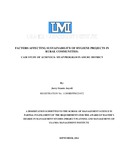| dc.contributor.author | ANYOLI, Jerry Grants | |
| dc.contributor.author | A`Diburu, Andama Felix(Supervisor) | |
| dc.contributor.author | Bongomin, Lugemoi Wilfred(Supervisor) | |
| dc.date.accessioned | 2017-07-19T08:41:07Z | |
| dc.date.available | 2017-07-19T08:41:07Z | |
| dc.date.issued | 2014-09 | |
| dc.identifier.citation | APA | en_US |
| dc.identifier.other | 11/MMSPPM/25/072 | |
| dc.identifier.uri | http://hdl.handle.net/20.500.12305/197 | |
| dc.description | A Dissertation submitted to the Higher Degrees Department in partial fulfillment of the requirements for the award of the Master’s Degree in Management Studies (Project Planning and Management) of Uganda Management Institute | en_US |
| dc.description.abstract | This study examined factors that affect sustainability of hygiene projects in rural communities, case study of ACDI/VOCA- MYAP program in Amuru District. The objectives of the study were; to assess how the participation of beneficiaries in technical training sessions contributed to the adoption of good personal hygiene practices promoted by the project, to examine how cultur-al beliefs and practices on hygiene in the community affected the sustainability of good hygiene practices, to find out how household income affected sustainability of good personal hygiene practices and to examine the extent to which access to water affected sustainability of good per-sonal hygiene practices. The methodology employed was case study design and used question-naires, observation guide and key informant interviews to collect qualitative and quantitative da-ta.
Findings from this study revealed that; there is a positive significant relationship between benefi-ciary participation and adoption of promoted good hygiene practices. Cultural practices and be-liefs about hygiene in communities hindered adoption and sustainability of good hygiene practic-es. Household income had no statistically significant effect on sustainability of good hygiene practices and maintenance of hygiene facilities. More households (66%) are able to access safe water from their main sources of water (Borehole, protected wells and springs). However, most of these water sources are ageing or malfunctioning and need immediate repair for the communi-ties to continue using them for better hygiene and sanitation.
The study recommends that; Beneficiary participation should be included while designing and implementing health and hygiene projects. More efforts need to be added in sensitizing the communities about dangers of unhygienic cultural practices. This should be done through aware-ness programs that address distorted perceptions about good hygiene in the communities. Water and sanitation project interventions by NGOs, CBOs and government of Uganda need to focus and ensure increased construction, repair and maintenance of water sources in Amuru district.
This study was limited by the geographical scope which covered only Amuru district, and case study as a methodology, therefore, a repeat of this study needs to be done in other districts in Acholi Sub region using a different methodology to get a stronger generalisation of findings | en_US |
| dc.language.iso | en | en_US |
| dc.publisher | Uganda Management Institute | en_US |
| dc.subject | Hygiene Projects | en_US |
| dc.subject | Rural Communities | en_US |
| dc.subject | Sustainability | en_US |
| dc.subject | Amuru District | en_US |
| dc.title | Factors affecting Sustainability of Hygiene Projects in Rural Communities: Case Study of Acdi/Voca- Myap Program in Amuru District | en_US |
| dc.type | Book | en_US |

